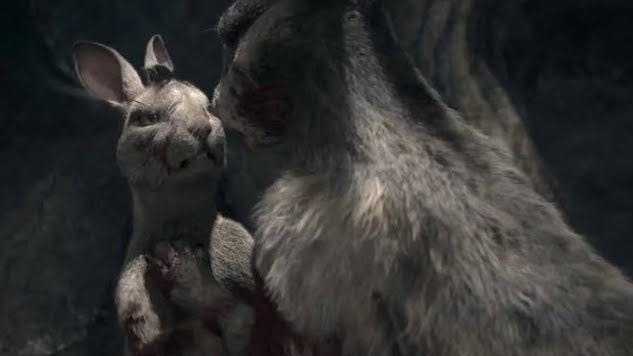Watership Down is a book about rabbits seeking out a new home. Along the way, they must overcome various challenges, from predators to tyrants from other warrens. Richard Adams, the author, infuses the story with mythology and a language that would have made Tolkien proud, and you’ll never look at a rabbit the same way again.
Netflix released a Watership Down miniseries in 2018. Spoiler alert: it’s not good. The production values and voice talents are fine, but it showed such a profound misunderstanding of some of the book's main themes that it made me wonder whether they read the book or just relied on a quick outline generated by an intern. I’m not a stickler for absolute accuracy when it comes to movie and TV adaptations, but betraying the theme and what a character stood for in the source material is unforgivable.
There is the typical feminist nonsense they litter in the story, so the does, the female rabbits, are also soldiers. That gets an eye-roll, but that’s expected crap smeared on the top. Hopefully, you can still dig down past it and find an unsullied core underneath. But it gets worse.
The miniseries flubs one of the great scenes from the book. Maybe the great scene from the book.
General Woundwort, the villain, has invaded the new home of the protagonists. Woundwort is a vicious giant of a rabbit. No rabbit dares to stand against him. He rules his territory with fear and pain, and in the end, he is able to even wound a dog during his final scrabble.
Hazel, the small, unassuming leader, has told Bigwig, the loyal soldier, to hold his position until he gets back. Bigwig fights Woundwort to a standstill inside the close confines of the warren. Woundwort is bigger than Bigwig, but Bigwig is smart and tenacious (and plenty big himself.) They are both wounded.
Woundwort tells Bigwig to let him pass, and he will spare his life and give him a command. All hope seems lost anyway because the invaders have opened one of the runs.
But Bigwig stands his ground. He says, “My Chief Rabbit has told me to defend this run and until he says otherwise I shall stay here.”
This brings Woundwort up short. He had assumed that Bigwig was the Chief Rabbit because Bigwig was the biggest and strongest. It would never occur to him that Hazel, the small rabbit he met earlier, was the Chief. This realization sends fear through Woundwort and his ranks because they think there is a bigger rabbit out there somewhere. After all, why would a fighter like Bigwig recognize a smaller rabbit as his Chief?
But Bigwig is absolutely loyal to Hazel, and he is loyal because Hazel has shown himself to be a leader with skin in the game, to take risks, and to implement bold ideas. Watership Down is partly a story about how Hazel earns the trust of those under him.
This is a fantastic sequence that is the perfect culmination of the story so far.
But the makers of the Netflix miniseries have no idea why it works. They know they must have this scene, but they don’t trust the story, or they don’t trust the audience. Or both.
In the miniseries, after Hazel tells Bigwig to guard the run, he turns around, as if having a sudden flash of thought, and tells Bigwig what to say to Woundwort. To say that “My Chief Rabbit told me to defend this run…”
Notice what this does to the scene. It is no longer about the tenacity, courage, and loyalty of Bigwig. It is about another trick that Hazel wants to play because he has discerned how Woundwort thinks. Bigwig’s great victory is reduced to nothing more than a cheap ruse. The writers obviously don’t understand the power of loyalty, nor do they understand the importance of good leadership.
And by misunderstanding these things, they miss the point of Watership Down. They don’t even use their extended runtime to play with the worldbuilding of the source material.
Do yourself a favor, and read the book. Read it to your kids. And then read it again sometime in the future. I wish the makers of the miniseries had read it a few more times.



